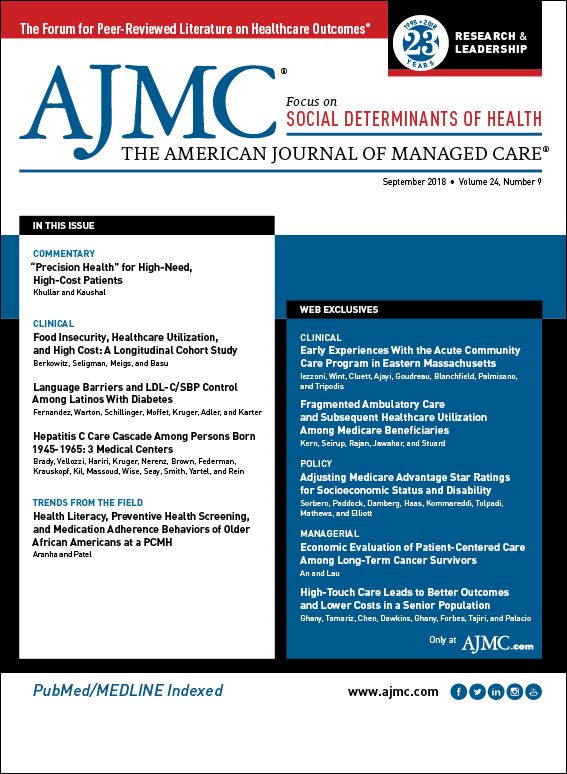- Center on Health Equity & Access
- Clinical
- Health Care Cost
- Health Care Delivery
- Insurance
- Policy
- Technology
- Value-Based Care
From the Editorial Board: A. Mark Fendrick, MD
The existence of health disparities among specific populations has long been recognized. Substantial variations in health insurance coverage, access to providers, use of specific clinical services, and patient-centered outcomes among different groups are well documented. Differences in levels of medical knowledge and information sources, trust and skepticism, participation, social support, and resources can vary significantly by population demographic. Adverse effects on healthcare equity have also been shown to be the result of clinician judgment, healthcare facility characteristics, and cultural milieu. A robust evidence base has determined that the causes of these disparate outcomes are multifactorial and include race, ethnic group, income, education, and age. It is difficult to attribute blame to any single factor, as many of the predictors are inextricably linked.
Identifying and implementing effective strategies to eliminate inequities in health status should be made a national priority. Achieving this ambitious goal will require multiple, preferably synergistic, interventions, including improved data systems, initiatives to appropriately train healthcare professionals, recruiting more providers from disadvantaged minority backgrounds, and increased regulatory vigilance.
This issue of The American Journal of Managed Care® (AJMC®) includes studies that further quantify the negative health impact of reduced health literacy and food insecurity. While typically outside the purview of clinicians and health plans, Berkowitz et al demonstrate the dramatic effect of food insecurity on both patient-centered outcomes and healthcare costs.
The issue also includes evaluations of innovative programs aimed at mitigating the negative effects of disparities. Specifically, Ghany and colleagues compared the clinical and economic impacts of a “high-touch” primary care model that included more frequent and longer provider encounters, courtesy transportation, and on-site medication dispensing. Beneficiaries who had access to the supplemental benefits visited their clinicians more often and had better preventive care use and medication adherence, as well as fewer hospitalizations, than those who did not have access to the program. Moreover, compared with those who received regular care, median healthcare costs were lower for those in the high-touch program.
In addition, Iezzoni et al report that the Acute Community Care Program, which partnered with an ambulance service to provide after-hours urgent care for socioeconomically disadvantaged adults, significantly reduced emergency department utilization. The decreasing cost of the intervention over the 2-year study suggests that the program might become cost-neutral as economies of scale are eventually realized.
Reducing health disparities is a herculean task requiring both population-based and individualized solutions. Moving forward, it is our hope that AJMC® will contribute to this issue through research aiming to better recognize the critical factors contributing to disparities in health outcomes and provide rigorous evaluations of interventions that reduce the clinical burden of disparities on individual and population health. 

Quality of Life: The Pending Outcome in Idiopathic Pulmonary Fibrosis
February 6th 2026Because evidence gaps in idiopathic pulmonary fibrosis research hinder demonstration of antifibrotic therapies’ impact on patient quality of life (QOL), integrating validated health-related QOL measures into trials is urgently needed.
Read More
Building Trust: Public Priorities for Health Care AI Labeling
January 27th 2026A Michigan-based deliberative study found strong public support for patient-informed artificial intelligence (AI) labeling in health care, emphasizing transparency, privacy, equity, and safety to build trust.
Read More
Ambient AI Tool Adoption in US Hospitals and Associated Factors
January 27th 2026Nearly two-thirds of hospitals using Epic have adopted ambient artificial intelligence (AI), with higher uptake among larger, not-for-profit hospitals and those with higher workload and stronger financial performance.
Read More
Motivating and Enabling Factors Supporting Targeted Improvements to Hospital-SNF Transitions
January 26th 2026Skilled nursing facilities (SNFs) with a high volume of referred patients with Alzheimer disease and related dementias may work harder to manage care transitions with less availability of resources that enable high-quality handoffs.
Read More

